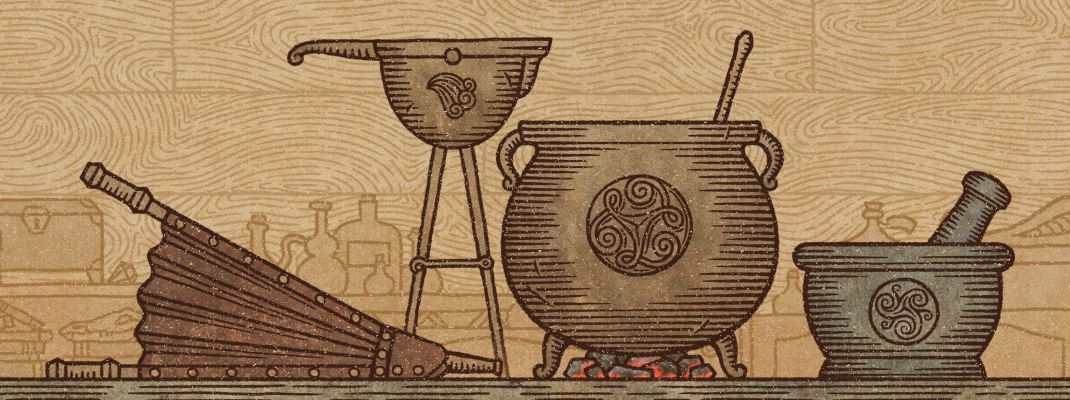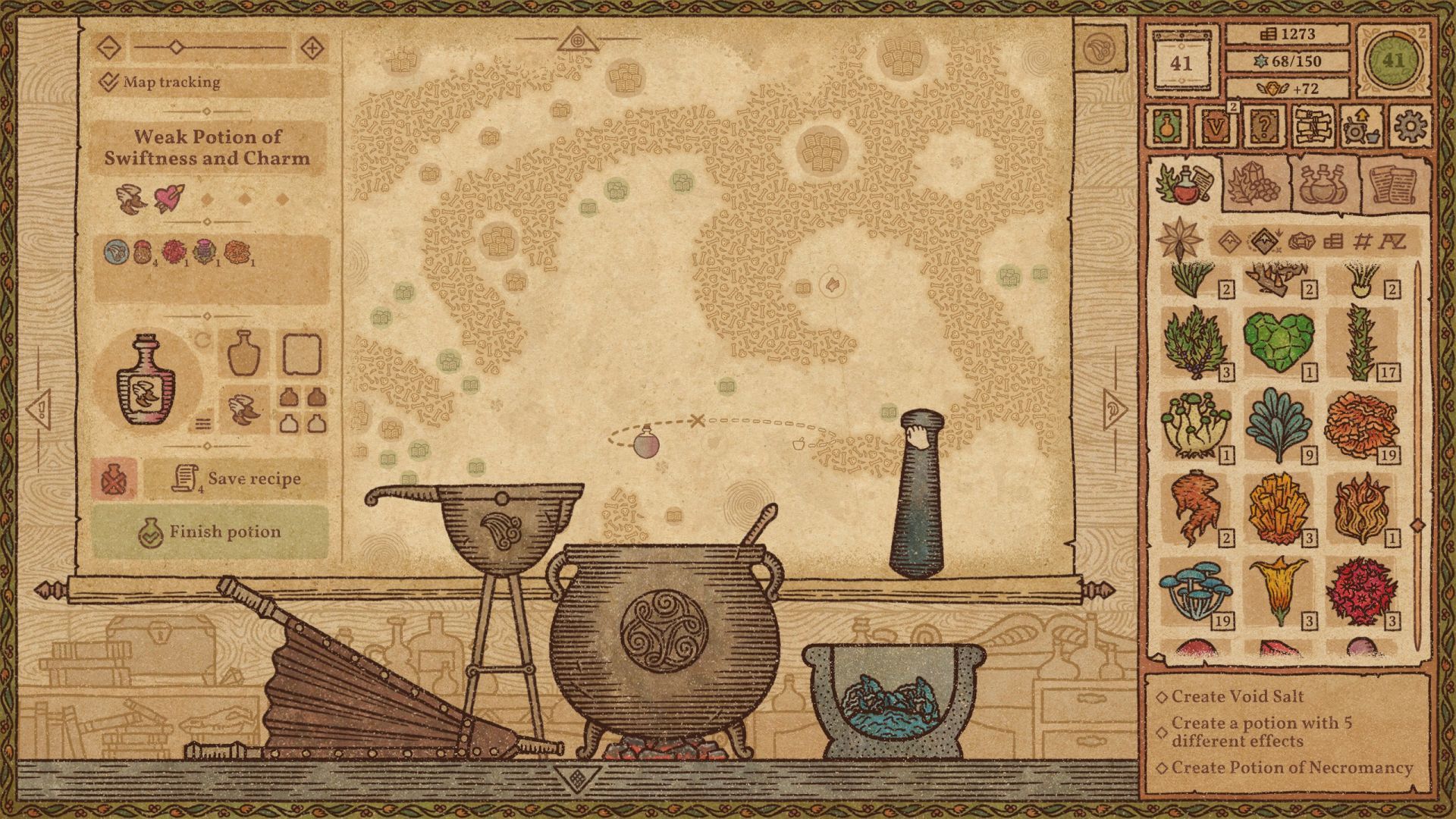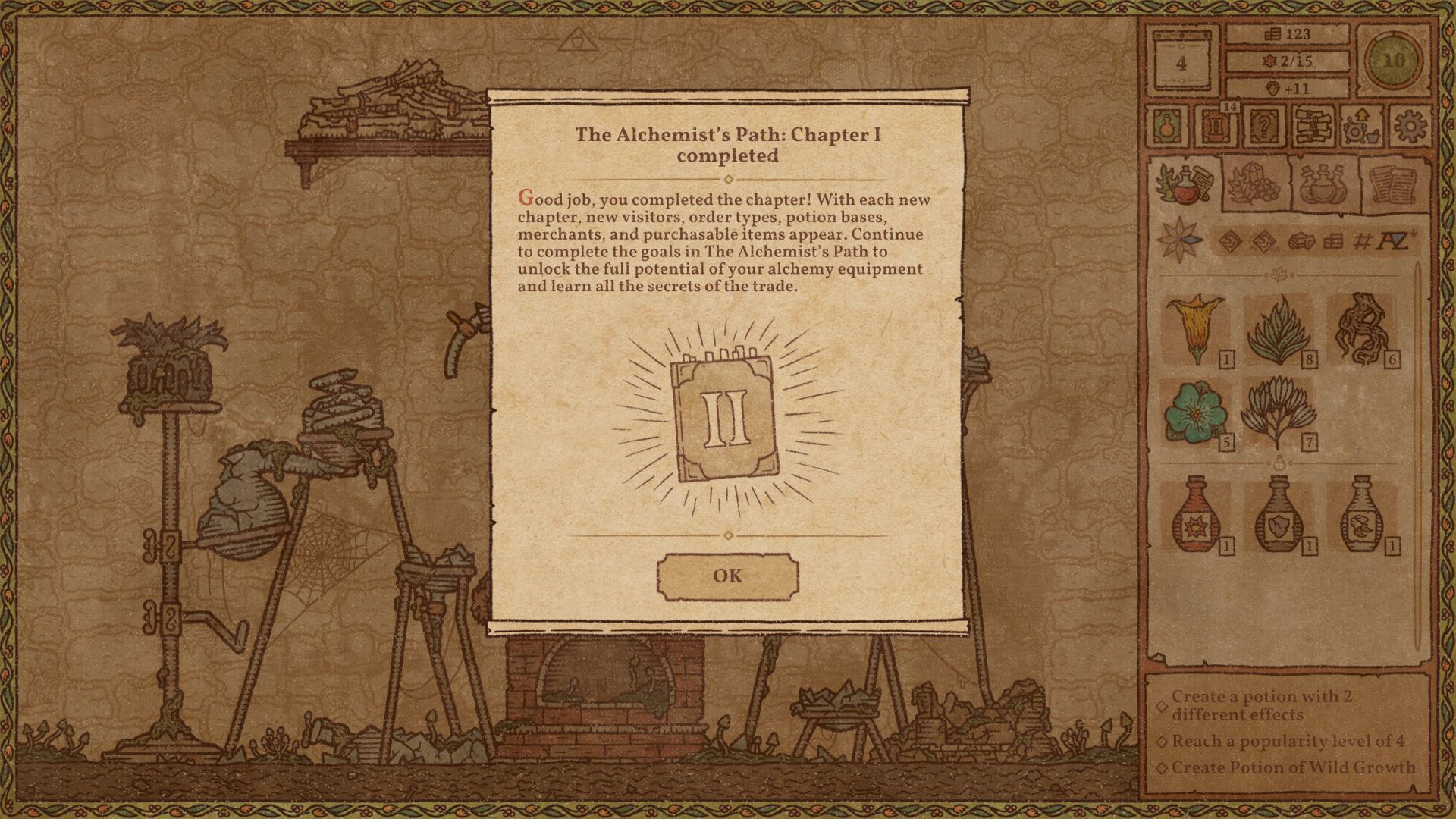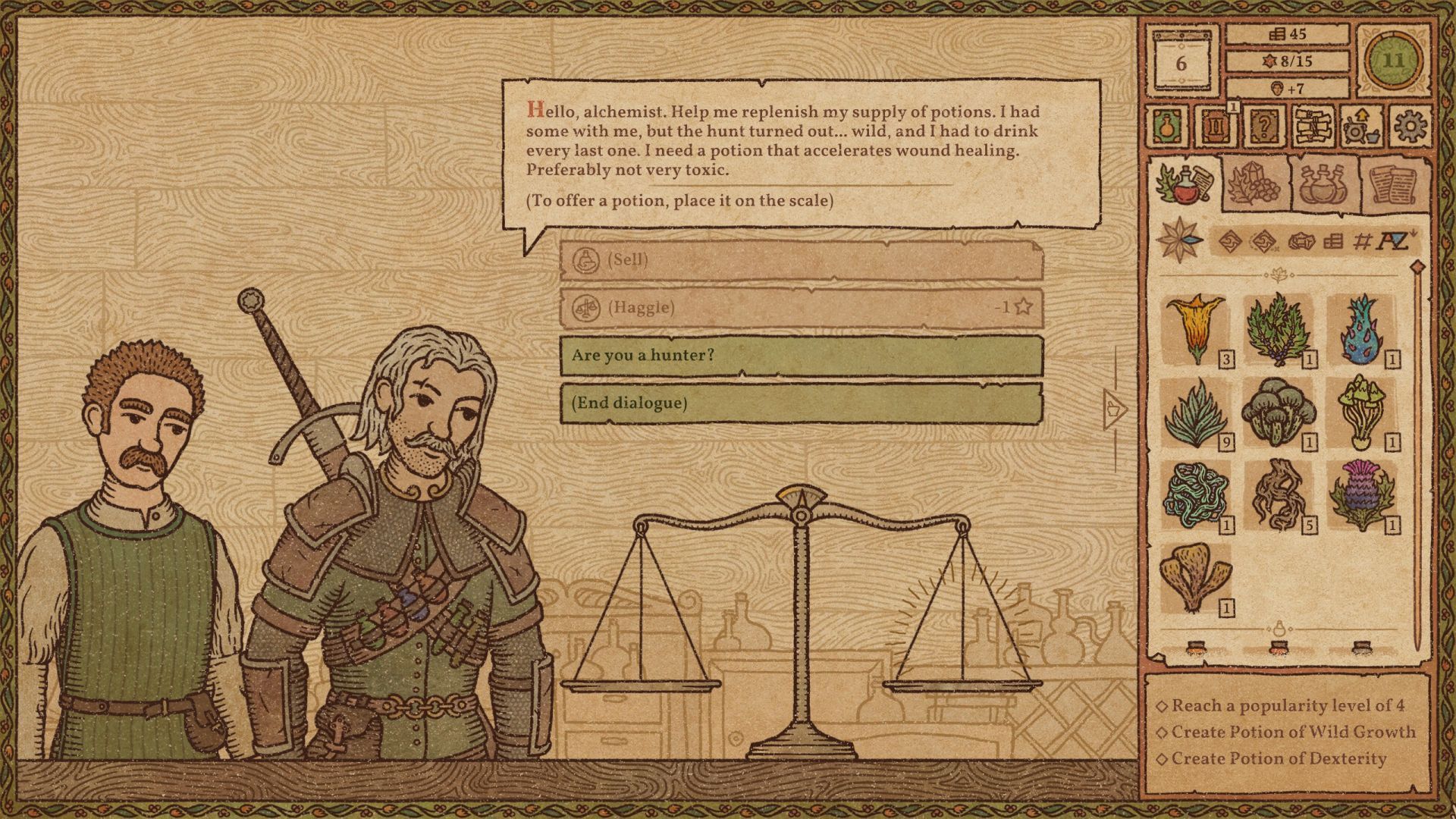In the din of the shop light, a silhouette approached, “Alchemist, I need your strongest potion. I seek protection in an upcoming fight.” The adventurer looked desperate as I set a vial on the counter. “I’d pay more for a stronger one, please!” Silly adventurer, they couldn't possibly handle my strongest potions -- also I do not have enough ingredients to make the strong version, so take what you can get. Dealing with customers is only part of the job, as gathering herbs for recipes, forming bonds with special merchants and experimenting with potion combinations makes for a full work day in the world of Potion Craft: Alchemist Simulator. Thoughtfully robust game design makes Potion Craft an easy-going game with a lot of depth. Using a forgiving crafting system, it’s a title that encourages players to explore different ingredient combinations as we search for a way to create the Philosopher’s Stone. Potion Craft is a title that blends unique crafting and exploration systems with the amusement of retail during the Medieval Ages to create an addictive, yet relaxing, experience.
The User Interface (UI) opens with an empty house that you have chanced upon while looking for a new start. Exhibiting charming Medieval artistry, Potion Craft is visually appealing and offers a cozy atmosphere. Wood-cut visuals mimic the period while creating a fantasy aesthetic. The house is made of several rooms where players conduct management tasks. The potion crafting map serves as the main room where players can return any time to venture into other sections of the house. The game features a unique crafting UI that encourages efficiency and ingenuity. Players will use tools of the trade to grind herbs, boil ingredients and plot a course to a finished product. The crafting map starts off partially obscured to encourage exploration of different herbs, roots, mushrooms and flowers that “chart” paths similar to a mariner navigating waters by stars and a compass.
Developer creativity shines as extraordinary looking herbs offer different ways to navigate the map. Depending on how the ingredients are cooked, this can take players further along the navigated course. Grinding ingredients allows players to extend their paths, while throwing in the whole ingredient makes for more succinct routes. To craft a potion, one must make sure the interactive potion icon overlaps varying potion silhouettes on the map. The more precise our overlap, the stronger the potion will be. And yes, it's possible to make potions with multiple effects -- yet this may not always be profitable (a potion of poison and healing is actually worthless). As we navigate the crafting map, mistakes can yield rewards as well by uncovering new areas and obtaining experience books. Take heed, however, as navigating our potion through dubious territory will make the craft fail. The game never punishes the player for mistakes, instead using them as a learning tool. Interacting with the UI is such a joy, as it does a wonderful job of simulating the craft. I may have had way too much fun using the mortar and pestle just to “feel” the varying resistances of different ingredients as they ground to dust. Players can customize the names, flavor texts and aesthetics of their potions for a personalized experience. Potion Craft does a great job of making it feel like the player is their own unique alchemist.
There are robust UI features that make the overall experience more enjoyable: easy management of recipes, straightforward interactions, as well as varying organizational and search functions. It’s a title that keeps necessary elements simple, while appropriately expanding on other areas. The room to the right holds the magical herb garden that refreshes a variety of your apothecary’s library for free, once daily. Sometimes, this may be the only method to get sorely-needed ingredients because all of the others were completely used, and making any customer request would be impossible. The money-inventory management begs the player to trust it by playing around potential deficits across pooled resources -- it may be worth it to forgo experimentation and focus on sales, for example. Thankfully, it’s never a punishable offense and lends itself to be on the forgiving side of making mistakes.
Going down to the basement, we find a peculiar device, or lack thereof -- it seems that in order to progress in your journey to true enlightenment through the magic of holistics, the purchasing of various pieces of alchemical equipment is required. The broken pieces of the alchemy machine shows where purchased pieces need to go. These pieces allow players to construct recipes that they’ll need later on to unlock more powerful and unique potions that will further fuel more powerful and unique crystalline formations used to make the Philosopher’s Stone. Are we potion sellers? Or are we alchemists? Only time may tell, as we further delve into the additional mechanic that's another daily requirement, the left side room.
Ah, the front-of-house where we deal with the delightful adrenaline rush that's entry-level entrepreneurship and brand new mechanics: customer service. And haggling. With the left side room, we have our potion-shop front. Customers line up at most (overlapping in a paper-puppet like fashion) and demand things of you. The goal is to simply make the potion that suits their needs the best. Whoever wrote this game knew the true horrors of customer service, and we can promise you this: no, customers do not get mad if you take a long time to fill their order. It’s a refreshing deviation from other merchant/trade games. This isn’t Overcooked or Moonlighter, instead giving a lot of control to the player for how they’d like to handle the sale. Patrons will often drop keywords that relate to various potions on your map. The more of the map that is revealed, and the more potion routes discovered, the easier to piece together what potion will best service which request. Players may have thought ahead and saved recipes for future use, but we may not always have the ingredients on hand. This prompts strategic thinking as to how to create the same potion using different ingredients. Even in sales, experimentation has its benefits. This also ties into understanding the alchemy machine that is in the basement as some customers will request a potion with multiple effects, which requires many different and varying types of plants to navigate the sea of possibilities.
Customers only get upset under two conditions. Firstly, players can deny the customers’ request and send them away. But a customer will also get upset and walk away if they're offered the wrong potion too many times for their request. Haggling and charging higher prices for the potions sold in the shop does not provide negative consequences, though. Haggling is a simple slide-click mechanic seen as recently in games like Cult of the Lamb, where a bar moves back and forth between two parts and has an optimal reaction time to achieve the best result. In this case, the base result is getting either the highest price for your potions or the lowest price from merchants who also come into your shop. For players wanting a better deal without needing fast reaction times, there are varying difficulties of haggling levels for more laid-back dealings. Haggling does affect how quickly your shop gains reputation and popularity, though. This isn’t necessarily good or bad. It’s easy to gain these things back and players can always rebuild from scratch. Popularity affects how many people visit the shop per day, as well as price points and merchant deals. Reputation affects the kinds of patrons that frequent the shop. Sometimes, customers with nefarious schemes and dastardly deeds will come in and request a potion that will disappoint Uncle Ben with how this great power is being used so irresponsibly. It's best to dismiss these customers to maintain a good reputation. With a higher rating on Yelp, gained by happy customers, it also opens access to more money for potions sold, a higher flow of customers, better ingredients sold from the merchants at better prices. Use your mixology powers for good and you’ll get a more charming customer base. While the game doesn’t punish players for their morality or popularity, it’s important to keep good business practices in mind as special merchants come our way. These merchants are the only way to purchase other, additional supplies needed to run operations.
Specialty merchants also come in handy when ingredients are low. There's the herbalist, who sells different roots, flowering plants and herbs. The mushroom man, who sells roots and mushrooms specifically. The dwarf who sells different stones that provide unusual effects when crushed and placed into the potions. The retired alchemist, who sells you story-critical pieces of equipment, base ingredients and recipes, and the general merchant, who sells just a bit of everything, and sometimes cheaper than the other merchants. An in-game cameo of everyone’s favorite "Witcher" hints at possible monster parts to come in the future. Developers have already planned content updates in the future that will expand the game even further by adding new skills, recipes, ingredients and more.
The haggling mechanic with the merchants works differently. They'll have a selection of items in their inventory that they'll offer at various prices. These prices can be tracked for their value, which will have competing prices amongst other merchants, such as checking Amazon to see if it’s really cheaper than just picking it up at Walmart. As the potion seller, the ability to navigate dastardly price points is eased by utilizing potions created while exploring the map. This is where a commitment to exploring will work as a potential financial boon. Depending on how quality, or uniquely made a potion is, the higher the price a merchant will offer it, or offer a discount of your cart total.
Having little or no reputation isn’t punished either. Unlike most shop-keeping games, the cost of upsetting customers, dropping down to zero reputation or customer satisfaction won't set back any progress towards making the most powerfully potent potions. Sometimes, resource management towards alchemical perfection lends itself to upsetting customers by closing up shop for the day and dismissing every customer who comes in, and dropping reputation, even if it’s just to be able to barely manage to make a healing potion the next day to haggle it for an exorbitant price to get better ingredients. Potion Craft takes many of the overused vending mechanics found in similar titles and puts all the control in the hands of the player -- there is no “wrong” thing to do here.
Closing Comments:
Potion Craft: Alchemist Simulator is a thoughtful, intelligent crafting title that offers deeply-robust gameplay that's well worth the time. The unique crafting system of navigating potions through a sea of recipes is fun and enticing. Interacting with ingredients to see what combinations are most effective is the heart of the crafting system. With no punishment for failure, Potion Craft encourages natural curiosities by rewarding players that experiment. The title upholds that failure is a feature, not a bug, as players must ultimately figure out how to create the Philosopher’s Stone. Learning from failures can help influence business practices and planning in ways that feel balanced. It's a game that's easy to get into and also rewards committed play. With even more content to come, the title holds hours of gameplay and mystical secrets for the potion sellers of the world. Smart mechanics, witty writing and cozy aesthetics make Potion Craft: Alchemist Simulator a must-play title helping to wrap up 2022.




